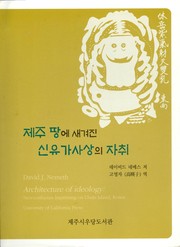
The architecture of ideology by David J. Nemeth ( in translation)
By David J. Nemeth
Subjects: Geomancy, Neo-Confucianism, Jujudo, feng-shui (Korean p'ungsu), Hallasan, cultural landscape, Civilization, Korea, religion, Neo-Confucian ideology, Neo-confucianism, History
Description: **Cheju Island**, Korea's historic island of exile, with a harsh natural environment, early developed a negative image as human habitat. The author challenges this perception and shows how Neo-Confucian state ideology during the Yi dynasty (A.D. 1392-1910) created and conserved the island as a viable habitat by using feng-shui--a powerful medieval science of surveying--to shape the island's built environment and quality of life. The outcome, reflecting sustained political commitment to the philosophical concept of enlightened undervelopment, was a sincere landscape inhabited by a virtuous people. Cheju Island, Korea's historic island of exile, with a harsh natural environment, early developed a negative image as human habitat. The author challenges this perception and shows how Neo-Confucian state ideology during the Yi dynasty (A.D. 1392-1910) created and conserved the island as a viable habitat by using feng-shui--a powerful medieval science of surveying--to shape the island's built environment and quality of life. The outcome, reflecting sustained political commitment to the philosophical concept of enlightened undervelopment, was a sincere landscape inhabited by a virtuous people.
Comments
You must log in to leave comments.